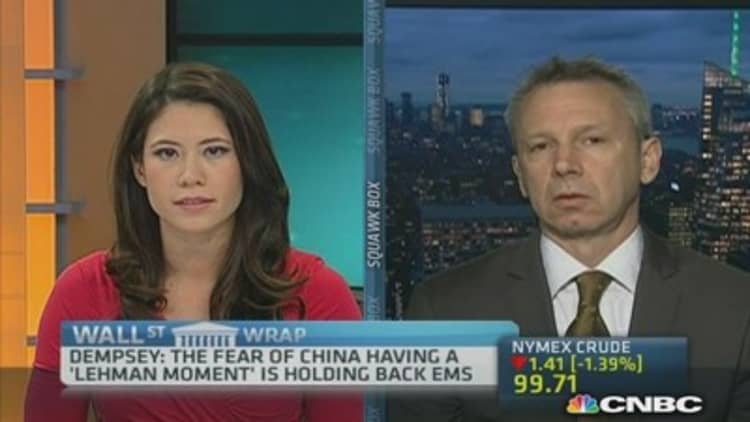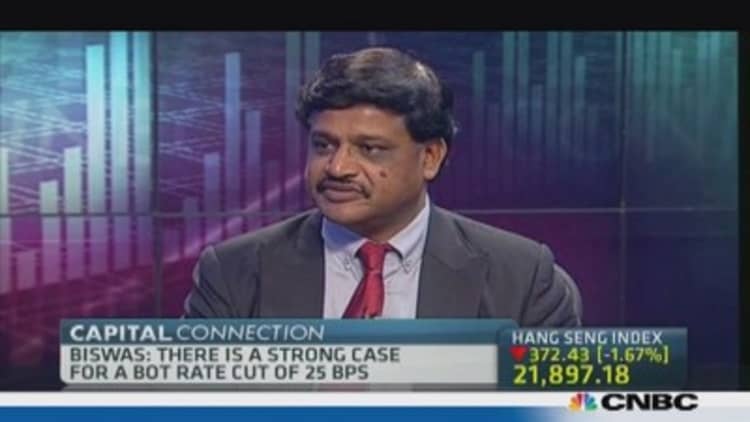
Ongoing worries over China's economy weighed Asian equity markets down on Wednesday, while overnight losses on Wall Street further ignited a flight-to-safety.
Copper was given the spotlight for the day as prices fell to their lowest level in nearly four years overnight. Selling was intensified by worries about cooling Chinese demand and the liquidation of inventories used for finance deals.
Tai Hui, Chief Market Strategist Asia at J.P. Morgan Funds, told CNBC's Asia Squawk Box, "The timing of this volatility coincided with a level of pessimism on China that we haven't seen for quite some time.
(Read more: Traders watch to see why copper getting scorched)
"As a result, people are starting to backtrack every step along the way. In that sense, the collateral use of copper, steel and iron may be more of a negative story in the near term," he added.
Wall Street shares declined on Tuesday on commodity jitters, while concerns about Ukraine lingered and investors awaited signals on the state of the economy.
The Dow Jones Industrial Average dropped 0.4 percent, while the S&P 500 shed 0.5 percent. The tech-heavy Nasdaq declined 0.6 percent.
Tokyo skids 2.6%
Japan's benchmark Nikkei index slumped to a one-week-low as investors locked in profits after Tuesday's rally.
A slightly stronger currency also soured sentiment. The yen rebounded to trade at 102.8 against the greenback on late Wednesday, further weighing down on exporter stocks.
Automakers Toyota Motor and Honda Motor plunged 2 percent each. The latter plans to boost monthly wages by 2,700 yen ($26.17).
Index heavyweights Softbank and Fast Retailing posted hefty losses of 4 and 3 percent, respectively.
(Read more: We can increase web speeds tenfold: SoftBank CEO)
Shanghai sheds 0.2%
Mainland shares were choppy on Wednesday, amid nervousness about the domestic economy. After spending time in both positive and negative territory the Shanghai Composite finished only slightly lower.
Among losers, Sinopec plunged 5 percent while Petrochina slipped 2.2 percent.
Property stocks extended Tuesday's gains to provide some support. China Merchants Property and Poly Real Estate climbed nearly 6 and 3 percent, respectively.
Banking stocks were in focus, after the Chinese central bank announced that it was prepared to cut bank reserves should economic growth falter. Minsheng Bank and Merchants Bank rose 1.3 percent each.

Sydney slips 0.6%
Australian shares got off lightly compared with their regional peers on Wednesday, finishing nearly 0.6 percent lower.
Underpinned by worries about China's economy and a weaker-than-expected consumer confidence report, the benchmark S&P ASX 200 index touched a one-and-a-half-week low of 5,345 earlier in the session.
Consumer sentiment slipped for a fourth month in March, reflecting pessimism about the economic outlook and jobs.
Copper stocks had a rough day; Oz Minerals lost 2.5 percent while PanAust tanked 4 percent.
Retail stocks dwindled on the back of weak consumer confidence data; Myer Holdings dropped 0.7 percent while David Jones fell 1.5 percent. The latter had announced on late Tuesday that Paul Zahra would stay on as chief executive.
Mining stocks helped to limit declines, as BHP Billiton and Rio Tinto added 0.2 percent each.
(Read more: China central bank ready to act if growth falters)
Seoul loses 1.6%
South Korean shares slumped to a three-week low of 1,932, on Wednesday, posting their biggest daily loss since February 4.
China, South Korea's biggest export market, was a top concern among investors. "The market have yet to shake off their concerns about corporate debt default and shadow banking in China," E-trade Investment analyst Choi Kwang-hyeok said to Reuters.
Steelmakers and chemical producers were under pressure amid concerns over a slowdown in China. Lotte Chemical and Hyundai Steel ended 4.5 and 3.6 percent lower, respectively.
South Korea finalized a free trade agreement with Canada on early Wednesday, which will see a 6.1 percent tariff on the former's auto imports being phased out in three annual cuts. Automaker Kia Motors was moving on this news until midday when it lost a 0.5 percent gain to inch into negative territory by 0.2 percent.
Meanwhile South Korea's unemployment rate rose to a three-year high of 3.9 percent in February, from 3.2 percent in January.

Emerging markets mixed
Thai shares edged down 0.2 percent late Wednesday, as the Bank of Thailand announced a 25 basis point rate cut. This was in line with expectations, as traders hope for a rate cut to address poor economic growth due to months of political unrest.
However, some analysts feel Thailand may need more than a rate cute to reboot its economy.
Rajiv Biswas, Senior Director and Asia-Pacific Chief Economist of IHS Global Insight, told CNBC's Capital Connection, "I think the question the Bank of Thailand is facing is whether additional monetary stimulus is really going to deliver improvements to the economy."
"The fundamental problem the economy is facing is the political turmoil that's really hurting business and consumer sentiment. So i think the key to restarting the economy is going to be in the political domain," he added.
Indian shares saw a modest gain on late Wednesday, as investors awaited the release of its consumer price index (CPI) for February. The benchmark BSE index closed up 0.14 percent.
— Follow us on Twitter: @CNBCWorld

